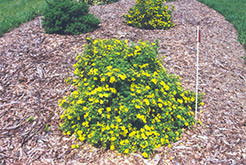It's all about ...
plants

Yellowbird Potentilla
Potentilla fruticosa 'Yellowbird'
Height: 4 feet
Spread: 3 feet
Sunlight:
![]()
![]()
Hardiness Zone: 2a
Other Names: Bush Cinquefoil, Shrubby Cinquefoil
Description:
A popular larger cultivar with bright gold double flowers from June until frost and fine textured foliage, very showy over a long period; the perfect flowering shrub for northern gardens, hardy, tough and adaptable as they come, but dislikes wet soils
Ornamental Features
Yellowbird Potentilla has lemon yellow flowers at the ends of the branches from late spring to early fall. It has bluish-green deciduous foliage. The small ferny compound leaves do not develop any appreciable fall colour.
Landscape Attributes
Yellowbird Potentilla is a dense multi-stemmed deciduous shrub with a more or less rounded form. Its relatively fine texture sets it apart from other landscape plants with less refined foliage.
This is a relatively low maintenance shrub, and is best pruned in late winter once the threat of extreme cold has passed. It is a good choice for attracting butterflies to your yard, but is not particularly attractive to deer who tend to leave it alone in favor of tastier treats. It has no significant negative characteristics.
Yellowbird Potentilla is recommended for the following landscape applications;
- Mass Planting
- General Garden Use
Planting & Growing
Yellowbird Potentilla will grow to be about 4 feet tall at maturity, with a spread of 3 feet. It tends to fill out right to the ground and therefore doesn't necessarily require facer plants in front. It grows at a slow rate, and under ideal conditions can be expected to live for approximately 30 years.
This shrub does best in full sun to partial shade. It is very adaptable to both dry and moist locations, and should do just fine under average home landscape conditions. It is considered to be drought-tolerant, and thus makes an ideal choice for xeriscaping or the moisture-conserving landscape. It is not particular as to soil type or pH. It is highly tolerant of urban pollution and will even thrive in inner city environments. This is a selection of a native North American species.
